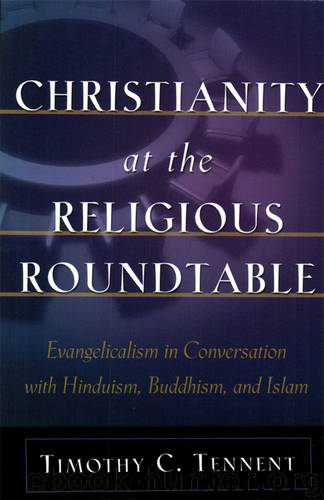Christianity at the Religious Roundtable by Timothy C Tennent

Author:Timothy C Tennent [Tennent, Timothy C]
Language: eng
Format: epub
Tags: Religion, Comparative Religion
ISBN: 9780801026027
Google: ByuNAAAAMAAJ
Amazon: 0801026024
Publisher: Baker Publishing Group
Published: 2002-10-31T23:00:00+00:00
Evangelical reply:
I completely agree that the idea of procreation and temporal sequence cannot be properly applied to God. However, the doctrine of the Trinity denotes neither of these. Let me explain. First, it is essential to understand that fatherhood and procreation are two separate ideas. An adopted child may refer to his or her parents as ‘father’ and ‘mother’ even though there is absolutely no genetic, procreative link between them. It is an expression of a relationship. This is because procreation and fatherhood are separate.
In Christianity, the terms father and son refer to a spiritual, not a physical, relationship. The ideal father is related to his son through love, tenderness, and communion, and it is these relational qualities that the words convey. Unfortunately, in Arabic the connotations associated with the word for son (ibn) are hardly distinguishable from the connotations for the word for child (walad). However, in many other languages the semantic range of the terms father and son are much broader. In Judaism, for example, it is normal to address someone as father as an expression of respect or as son to reflect a relationship of affection, even though they are completely unrelated in a physical or genetic sense. These terms refer to a spiritual and moral relationship and do not imply either physical corporeality or physical procreation. Christians affirm that God is incorporeal, infinite, and omnipresent, all of which would be contradicted if we also affirmed a doctrine of corporeality. The New Testament declares that “God is spirit” (John 4:24). I will not address in this current dialogue how the Son of God, at a certain point in human history, took on physical corporeality in an act we call the incarnation, since our next dialogue is dedicated to addressing this particular question.
As for temporality, it is impossible for a father to temporally precede his son. The two terms are completely reciprocal. A man does not become a father until the precise moment when the son is born. Indeed, one cannot occur without the other precisely because the terms are inherently relational. In reference to God, however, it refers to an eternal relationship without any temporal beginning, which is why Jesus prayed in the Garden of Gethsemane, “Father, glorify me in your presence with the glory I had with you before the world began” (John 17:5). Thus, the terms signify an eternal, coequal relationship, “that all may honor the Son just as they honor the Father” (John 5:23).
Of course, as my Muslim friend pointed out, there are those who have misunderstood this. The alternative is to abandon relational terms altogether, resulting in a metaphysically unified God who is closer to Pascal’s distant “God of the Philosophers” than to the God and Father of our Lord Jesus Christ with whom we may enter into a personal relationship. God is no abstract unmoved mover. On the contrary, he has revealed himself as a conscious, feeling, willing self who may be called by name. It is this personal relationship with God
Download
This site does not store any files on its server. We only index and link to content provided by other sites. Please contact the content providers to delete copyright contents if any and email us, we'll remove relevant links or contents immediately.
The 5 Love Languages: The Secret to Love That Lasts by Gary Chapman(8494)
The Space Between by Michelle L. Teichman(6087)
Assassin’s Fate by Robin Hobb(5236)
Wiseguy by Nicholas Pileggi(4586)
Everything Happens for a Reason by Kate Bowler(4067)
Gerald's Game by Stephen King(3918)
A Simplified Life by Emily Ley(3567)
The Power of Positive Thinking by Norman Vincent Peale(3447)
Pillow Thoughts by Courtney Peppernell(3395)
Resisting Happiness by Matthew Kelly(2886)
Girl, Wash Your Face by Rachel Hollis(2821)
Being Aware of Being Aware by Rupert Spira(2706)
Name Book, The: Over 10,000 Names--Their Meanings, Origins, and Spiritual Significance by Astoria Dorothy(2490)
Real Sex by Lauren F. Winner(2474)
More Language of Letting Go: 366 New Daily Meditations by Melody Beattie(2442)
The Holy Spirit by Billy Graham(2416)
Fast Facts on Defending Your Faith by John Ankerberg & John Weldon(2388)
Victory over the Darkness by Neil T. Anderson(2386)
The Secret Power of Speaking God's Word by Joyce Meyer(2253)
